| |||||
| Centuries: | |||||
|---|---|---|---|---|---|
| Decades: | |||||
| See also: | List of years in Portugal | ||||
Events in the year 1924 in Portugal .
| |||||
| Centuries: | |||||
|---|---|---|---|---|---|
| Decades: | |||||
| See also: | List of years in Portugal | ||||
Events in the year 1924 in Portugal .


The Municipal Stadium of Braga is an all-seater football stadium located in Braga, Portugal, and the current home of Sporting Clube de Braga. It has a capacity of 30,286 spectators, making it the seventh largest football stadium in Portugal. The stadium was designed by Portuguese architect Eduardo Souto de Moura who was awarded the Pritzker Architecture Prize in part for this design.

Manuel José de Arriaga Brum da Silveira e Peyrelongue was a Portuguese lawyer, the first attorney-general and the first elected president of the First Portuguese Republic, following the deposition of King Manuel II of Portugal and a Republican Provisional Government headed by Teófilo Braga.
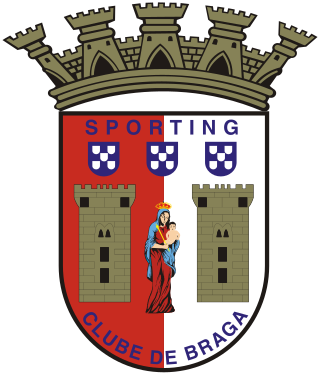
Sporting Clube de Braga, commonly known as Sporting de Braga or just Braga, is a Portuguese sports club from the city of Braga. Best known for the men's professional football team playing in the Primeira Liga, the top flight of Portuguese football at the Estádio Municipal de Braga, it also has departments for athletics, badminton, basketball, beach soccer, billiards, boccia, boxing, esports, futsal, karate, kickboxing, muay thai, swimming, taekwondo and volleyball.

António José de Almeida, GCTE, GCA, GCC, GCSE, was a Portuguese politician who served as the sixth president of Portugal from 1919 to 1923.

The Jerónimos Monastery or Hieronymites Monastery is a former monastery of the Order of Saint Jerome near the Tagus river in the parish of Belém, in the Lisbon Municipality, Portugal. It became the necropolis of the Portuguese royal dynasty of Aviz in the 16th century but was secularized on 28 December 1833 by state decree and its ownership transferred to the charitable institution, Real Casa Pia de Lisboa.

Joaquim Teófilo Fernandes Braga was a Portuguese writer, playwright, politician and the leader of the Republican Provisional Government after the overthrow of King Manuel II, as well as the second elected president of the First Portuguese Republic, after the resignation of President Manuel de Arriaga.
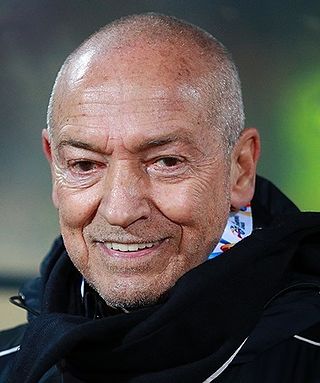
Manuel Jesualdo Ferreira is a Portuguese football manager who last managed Zamalek in the Egyptian Premier League.
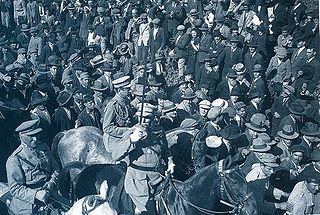
The 28 May 1926 coup d'état, sometimes called 28 May Revolution or, during the period of the corporatist Estado Novo, the National Revolution, was a military coup of a nationalist origin, that put an end to the unstable Portuguese First Republic and initiated 48 years of corporatist and nationalist rule within Portugal. The regime that immediately resulted from the coup, the Ditadura Nacional, would be later refashioned into the Estado Novo, which in turn would last until the Carnation Revolution in 1974.

Columbano Bordalo Pinheiro, who is usually referred to as Columbano, was a Portuguese Realist painter. Usually considered the greatest Portuguese painter of the 19th century, he has been compared to the likes of Wilhelm Leibl and John Singer Sargent.

The 5 October 1910 revolution was the overthrow of the centuries-old Portuguese monarchy and its replacement by the First Portuguese Republic. It was the result of a coup d'état organized by the Portuguese Republican Party.
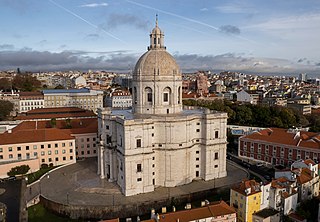
The Church of Santa Engrácia is a 17th-century monument in Lisbon, Portugal. Originally a church, it was converted into the National Pantheon, in which important Portuguese personalities are buried. It is located in the Alfama neighbourhood, close to another important Lisbon monument, the Monastery of São Vicente de Fora.

The Diocese of Faro, also called the Diocese of the Algarve and formerly the Diocese of Silves, is a Latin Church diocese of the Catholic church in Portugal. It is a suffragan of the archdiocese of Évora. The current bishop of Faro is Manuel Neto Quintas.
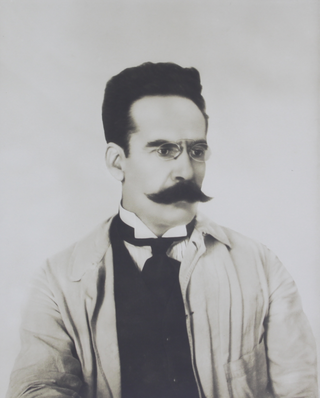
Manuel de Brito Camacho a Portuguese military officer, writer, publicist and politician, who among other positions, was Minister of Public Works, Commerce and Industry (1910–1911) and Republican High Commissioner to Portuguese Mozambique. He was the founder of the Partido Unionista, and director of the newspaper A Luta, the mouthpiece of the same Party.
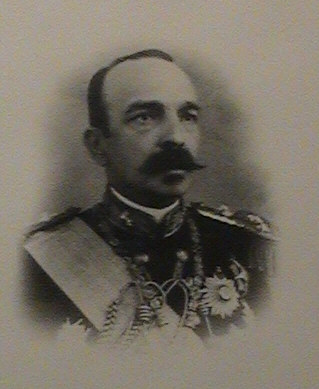
Sebastião Custódio de Sousa Teles, also known as Sebastião Teles, Sousa Teles, or in contemporary Portuguese as Sousa Telles, was a Portuguese politician and military officer. After a career in military logistics and education, he served multiple times as Minister of War, and briefly as President of the Council of Ministers from 11 April to 14 May 1909 during the penultimate year of the Portuguese constitutional monarchy.
Events in the year 1910 in Portugal.
Events in the year 1911 in Portugal.
Events in the year 1915 in Portugal.

Presidential elections were held in Portugal on 24 August 1911. Following the Portuguese revolution in 1910 which saw the overthrow of King Manuel II, a Republican Provisional Government was formed under the leadership of Teófilo Braga. This election was held to elect the first official president of the newly established the First Portuguese Republic. Portugal's 1911 constitution stated that the Congress of the Republic must elect the president in Lisbon instead of the Portuguese people.

Presidential elections were held in Portugal on 29 May 1915. Following the resignation of president Manuel de Arriaga, an election was held to see who would complete the remainder of his term. Portugal's 1911 constitution stated that the Congress of the Republic must elect the president in Lisbon instead of the Portuguese people.